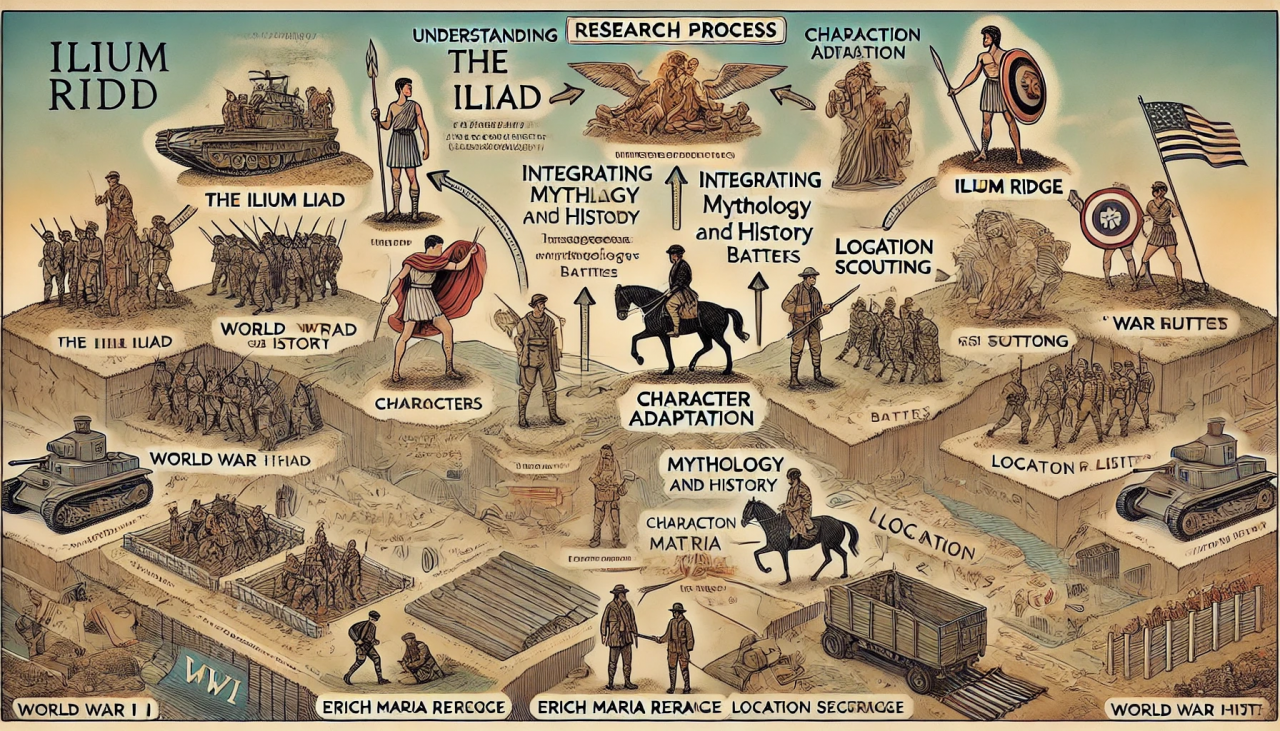I don’t know where the original idea for Ilium Ridge came from, but the parallels between the Trojan and First World Wars are too good to miss. Both feature an interminable war fought over a relatively tiny area, by soldiers who had more in common than what separated them. Both were presided over by divine, incestuously close figures. And both are tales of doomed heroes fighting both the enemy and their own incompetent commanders. The actual writing required research on several fronts (pun intended).
On the Greek side, I had to look at the original sources. The main one of course, was Homer’s Iliad. Alas, my childhood education was just a little late for me to learn ancient Greek, but I did study this in college in the excellent E. V. Rieu prose translation (I have never been a fan of poetry (which may seem incongruous in light of my other major project but whatever)). The story of Ilium Ridge is mostly a straight retelling of Homer’s story, in which:
The Achaeans have been beseiging Troy for 9 years. Invincible Achaean warrior Achilles captures Trojan maiden Briseis. His superior Agamemnon steals her away from him, which so enrages Achilles that he refuses to fight. His aide Patroclus impersonates him and leads their side into battle. Trojan hero Hector kills Patroclus, so Achilles rejoins the battle and kills Hector. He is finally persuaded to return Hector’s body to his father Priam.
That’s the end of the Iliad. There are various later myths about Achilles’ ultimate fate, so I have invented my own which is in keeping with the story. Naturally, I had to bring in the Horse at the end, based partly on the battle at Messines, where the sappers tunneled under German lines to devastating effect.

On the “modern” side, the events of 100 years ago seem in many ways as remote as those of 1200BC. The scientific innovations of the previous century led to an almost unimaginable catastrophe, overthrowing ancient institutions and ushering in an age of constant innovation which we are still struggling to deal with. (Even the Gods, in this story, recognise this, and their satirical solution (to their delight) brings about an even more savage battle than any before in their Great War.) The highest positions of power were reserved for the “well-born”, no matter how venal or incompetent, while the true heroes, if from the lower classes, could never escape the trenches. The role of women, too, was surprisingly similar; I will deal with this in a future entry.
The Trojan War has featured in several adaptions. The one that always springs to mind is Petersen’s 2004 Troy, which retells the mythological story pretty straight, though omitting the Gods (which I find regrettable; they are after all an integral part of the story). In that film Achilles is very well portrayed by Brad Pitt; if he were still the same age I would suggest him for our version, though the role is somewhat different (here is my own suggestion). The 2018 TV adaptation Troy: Fall of a City tells the same story, not as well, but does feature the Gods as active participants. I have always enjoyed the films of Terry Gilliam, and his blend of myth with reality in such works as Baron Munchausen can be seen in, for example, our Olympica Hotel and Spa, and the scenes with Homer himself.
There have also, of course, been many WWI films and TV shows: All Quiet on the Western Front (1920/2022), Paths of Glory (1957), Gallipoli (1981), Blackadder Goes Forth (1989), 1917 (2019); generally focusing on the chaos of battle and the futility of war in general. Possibly the best was Oh! What a Lovely War (1969), which contrasted the optimistic, militaristic music of the time with the deadly reality.
I suppose the most depressing aspect of researching a story like this is how similar things are now to what they were like 100, or 3000, years ago. Nations still exist, ruled by (mostly) men for whom war is still an acceptable way of solving disputes between them, or simply achieving personal glory, at the expense of the innocent millions who just want to live in peace. Ilium Ridge in that sense is descriptive, not prescriptive. No one’s going to learn anything from it that they don’t already know full well. We can only hope that the current rulers come to that realization for themselves before they destroy us all.
PS: For the header graphic, I gave ChatGPT the above text and asked it to come up with an appropriate picture. It makes no sense whatever, but I think it looks cool. What do you think?

Leave a Reply